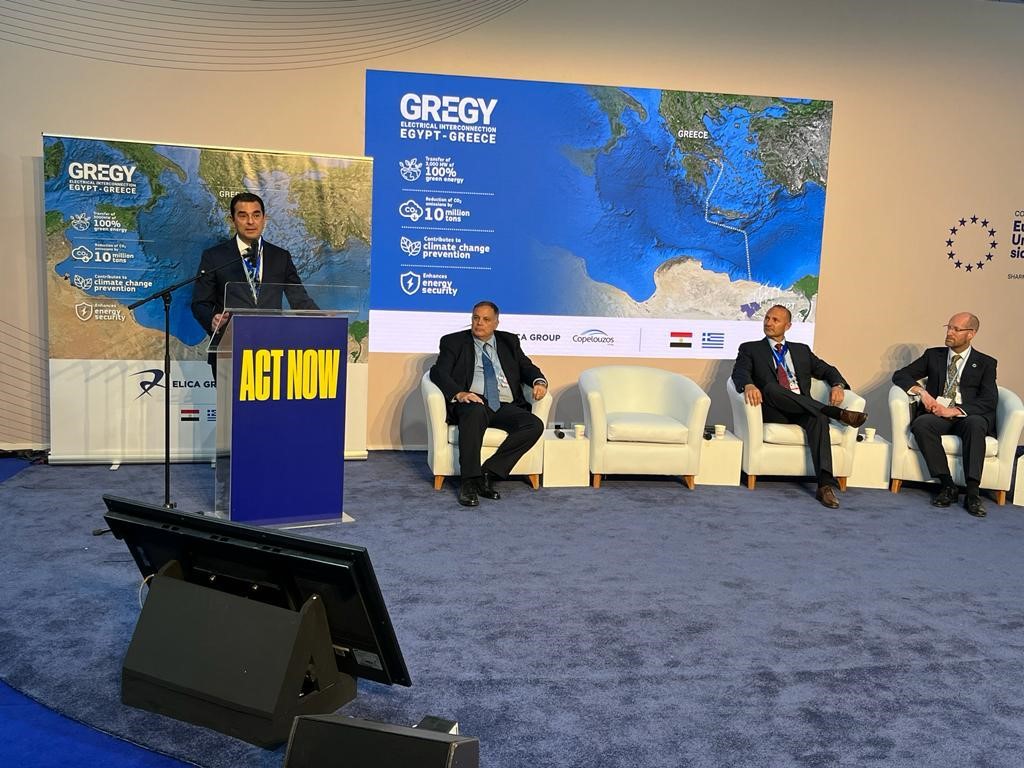Under the auspices of the Greek Ministry of Environment and Energy and with the participation of the Minister of Environment and Energy of Greece, Mr. Kostas Skrekas, the Minister of Energy of Bulgaria, Mr. Rossen Hristov and Mr. Harry Boyd-Carpenter, Managing Director for the Climate Strategy of the European Bank for Reconstruction and Development (EBRD), presented in the context of the United Nations World Conference on Climate Change COP 27 in Sharm El-Sheihk, Egypt, the project of the electricity interconnection Egypt-Greece (GREGY) that is being developed by the company ELICA SA of Copelouzos Group.
The presentation took place at the Pavilion of the European Commission, in the presence of many high-level invitees, Ministers, Ambassadors and Secretaries General. The Chief Executive Officer of the Renewables Sources and Energy Storage Business Unit of Copelouzos Group, Mr. John Karydas, presented the progress of the electric interconnection project and underlined in detail the multiple environmental advantages of a project that fully serves the European “green” goals for the energy.
As the Managing Director, Mr. John Karydas, pointed out, “The company ELICA of Copelouzos Group, with a fast but careful planning that takes into consideration all the parameters of such a geopolitically complex project, is preparing a huge investment in the field of green energy, essentially creating new circumstances in the energy map in South-Eastern Europe”.
The electrical interconnection between Egypt and Greece, through a submarine cable with a length of approximately 950 km and with a bi-directional capability, is characterized as one of the most important energy projects in Europe, of high priority, with a pivotal role in the new energy map that is currently being formed in the wider geographical area in the light of the recent geopolitical developments and the energy crisis.
As emphasized in this thematic presentation, the “GREGY-Elica Interconnector”, with a budget of €3.5 billion, will decisively contribute to the independence from fossil fuels and natural gas, as the submarine cable that will connect the two countries will carry 100% green, clean and cheap energy.
The 3,000 megawatts of green energy that will be transferred from Egypt to Greece will be generated from 9.5 GW of Renewable Energy Sources (RES) that Copelouzos Group will build and operate in Egypt, and they will be able to replace 4.5 bcm of natural gas annually and will reduce CO2 emissions by 10 million tons annually.
This is a project that is fully in line with the European Union’s strategy for the transition to green energy and the achievement of zero CO2 emissions by 2050, while at the same time it contributes to promotion of Greece as a vital hub of “green” energy in the wider region of the South-Eastern Mediterranean. The GREGY project is a flagship project for South-Eastern Europe and fully supports EU policy for the creation of green energy corridors between North and South, connecting the electrical systems of Europe and North Africa.


